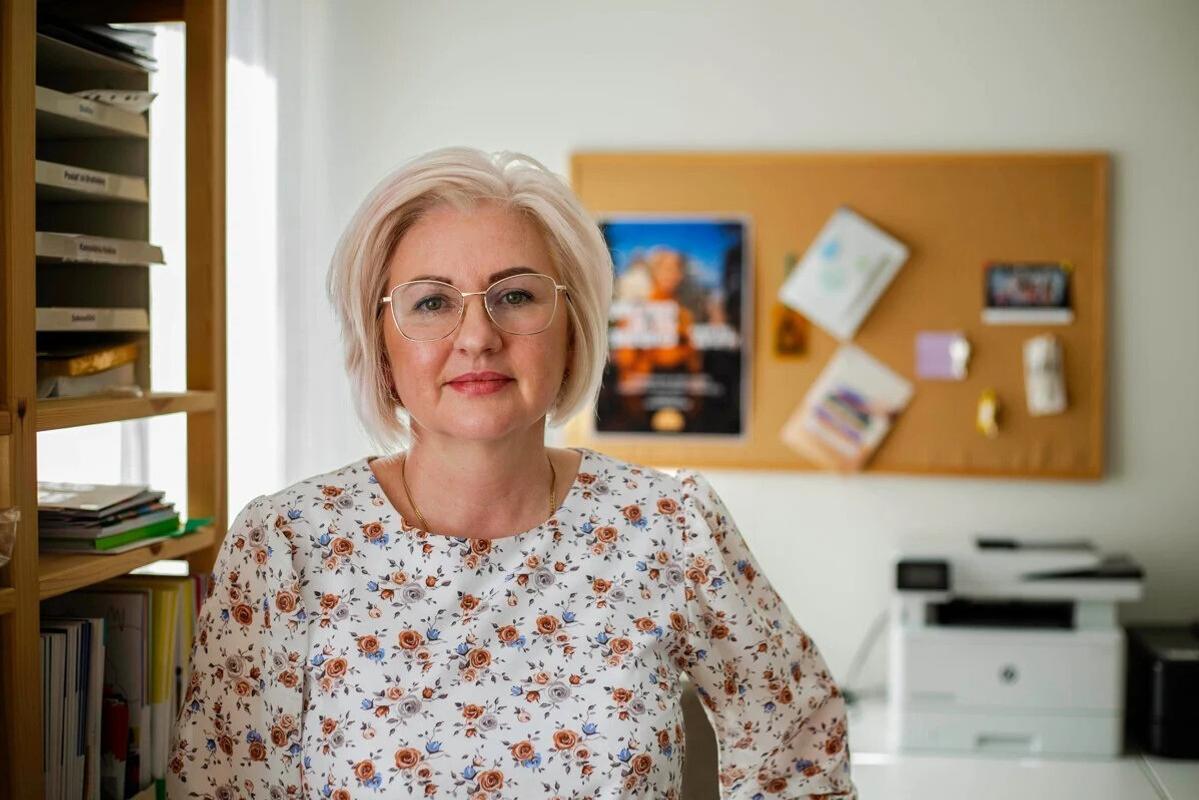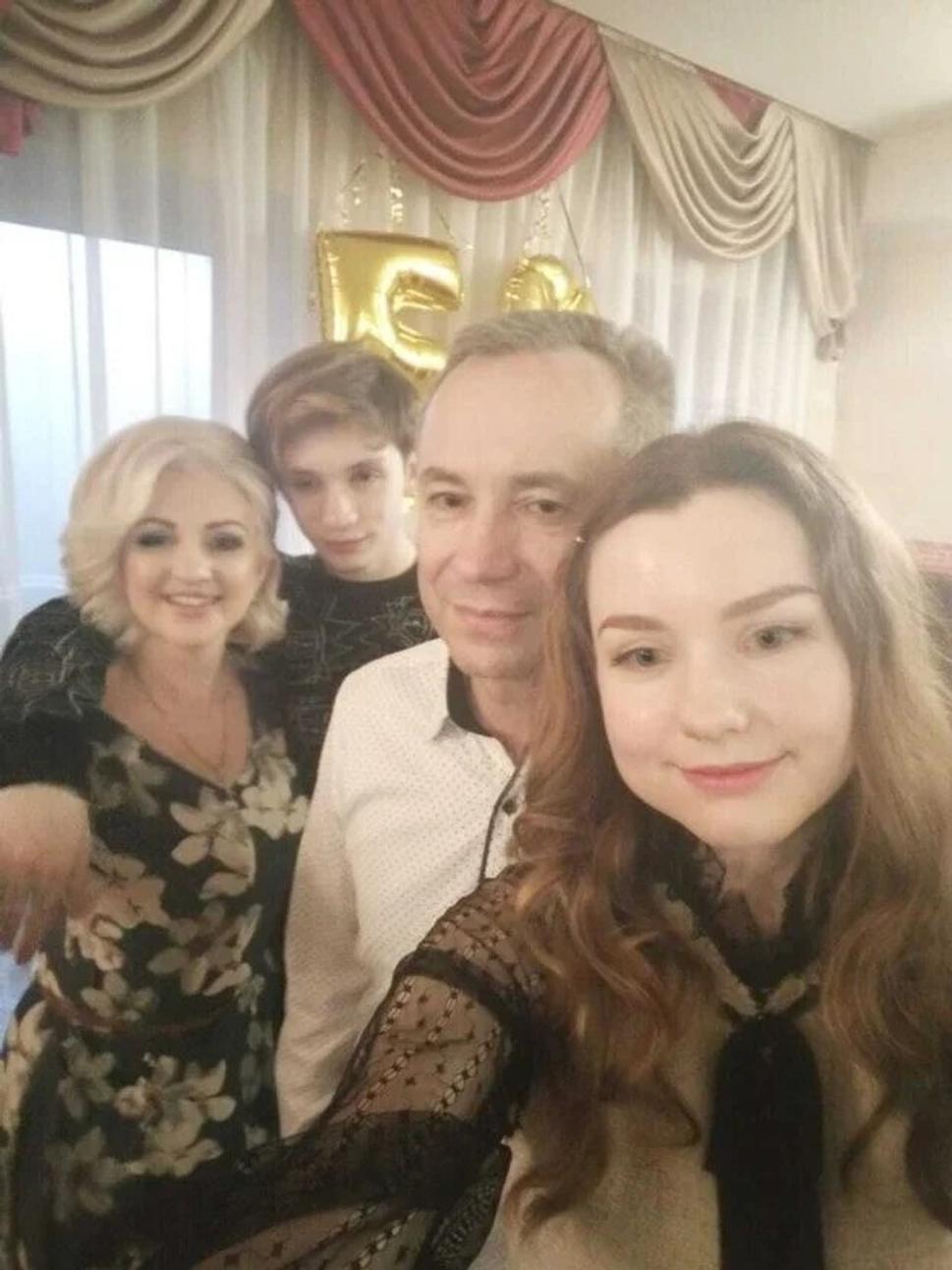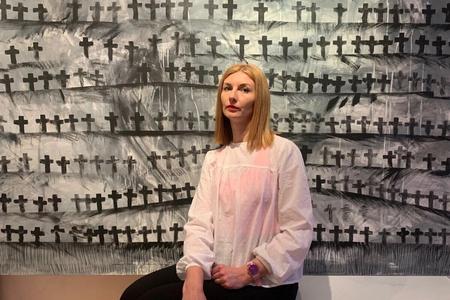Before the war, the chemist Yaroslava Lopushanska and her husband, a prominent Ukrainian scientist, lived a happy life in Uzhhorod. They have been together for more than 30 years, but the war divided their family. Today, what Lopushanska misses most is seemingly ordinary cuddling with her husband.
Uzhhorod, a city near the Slovak-Ukrainian border, had a population of 115,000 before the war. Today it is home to many internally displaced people from Ukraine, who have come from both Zaporizhia and Kharkiv. The city is relatively safe. However, like everywhere else in the country, there are power cuts.
Lopushanska wants to call home every day to her husband, and her mother, who lives about 40 kilometres from Uzhhorod. She therefore follows the outages that are announced in advance. When there is no electricity, neither does the internet work.
In Slovakia, she works in a grocery shop. With a Master of Pharmacy degree, she tried to get a position at the university. That has not worked out yet. When she has time off from her first job, she works part-time as a volunteer coordinator at Mareena in Košice, eastern Slovakia, where she is highly valued.
A successful career
Lopushanska, in her fifties, had a very good career at home. Her work made her happy and fulfilled her. She holds degrees from two universities, majoring in pharmacy. She worked as head of pharmaceutical laboratories and chief state inspector. Ukraine is divided into 25 administrative units. She represented Transcarpathia professionally.
After the war began, Lopushanska and her colleagues were given the task of detecting and registering the availability of medications. The work she had done before gradually diminished, and no longer exists today. However, she was in danger of not being able to leave Ukraine.
Her son was already in Slovakia and her daughter in Prague, the Czech Republic. Her husband could not travel, and so the decision was made that Lopushanska would also go to Slovakia. They could not imagine that their children would not be able to meet their parents.
“It was not an easy decision, but we made it so that I would be safe and close to our children. I think about home all the time, I miss it and I read the news all the time. But I know I’m better off here,” she says.
Life as a scientist during war
“My husband is a quite well-known Ukrainian scientist and a very good person,” Lopushanska says of Vasyl Lopushansky, a physicist and mathematician.
He works as a researcher at the Institute of Electronic Physics of the National Academy of Sciences of Ukraine. He has made significant contributions in the field of research on nanocrystals and their spectroscopic properties. Lopushanska says that when a person loves their work, they are successful at it.
Before the war, Lopushansky’s mother lived in the Lviv region; but after she suffered a stroke, she had to come live in Uzhhorod with her son. He takes care of her.
Every morning he takes care of her, gives her breakfast, then goes to work by car; then during his lunch break he goes home again to give her food and medicine. It sometimes happens that on the way he gets stopped up to five times to have his documents checked by the police.
At the beginning of the war, he helped out as a volunteer in addition to his work, similarly to their son in Slovakia. As Lopushanska says their son has already become an independent responsible man.
A wedding without father
When their daughter Bohdana got married in Prague in May this year, her father was unable to attend the wedding. She is not only his beloved daughter, but also his friend and colleague.
“Man or not, he cried,” says Lopushanska.
Bohdana studied physics and received her doctorate at the university in Uzhhorod. Then she managed to find a job in Prague. At the wedding, Nazarij the son substituted his father.
“He took it as a great responsibility. The wedding was modest, my daughter said she didn’t want a big wedding at such a time,” says Lopushanska.
The groom’s father was allowed to be at the wedding. He had been allowed to travel as his younger brother was killed in the war a year beforehand, so he was given permission.
“Such a trip was not joyful, his brother leaving behind two boys. They need a father, but they don’t have one any more,” Lopushanska adds.
Returning to Ukraine
Once a month, when Lopushanska’s evening shift at the shop ends at nine o’clock, she gets on the bus before 11 o’clock, and by three in the morning she is home in Ukraine.
“Even though I’m on the road all night, I feel good, I don’t feel tired,” she says about the nightly arrivals.
She tries to come home once a month. She prepares food, even for the freezer, but mostly to see her husband and parents.
“It hurts me a bit that I’m not there for them, but they have become very strong. My father has cancer, and he’s holding up very well. This motivates me, I feel that I’m strong, and that I can handle everything,” Lopushanska describes.
Their flat and the house they bought are still standing, so there is a place to come back to. Whether they will return to live there again one day, she cannot say. She admits to the possibility of staying in Slovakia.
“I would have never expected a war to start. A dog that barks doesn’t bite. And even when the war broke out, I told myself that it would last a few days, and it would be reasonably resolved,” she says, adding that she does not see the war ending any time soon.
Boys, get a degree, Ukraine will need you
Lopushanska’s son will be 21 in August. He studies at the University of Žilina, northern Slovakia.
“He was born when I was 30. I told myself, I didn’t give birth to him to go to war,” says the mother.
Nazarij already holds a Slovak secondary school diploma. He finished school in Prešov, eastern Slovakia.
“He also received an A in Slovak. The people at his secondary school were amazing. When the war broke out, the young Ukrainian boys studying there together said to one another: we can’t sit here, and we must return to Ukraine,” Lopushanska recalls.
The headmistress of the Slovak school sat them down and told them that their parents had invested too much in them and their education, which is why they could not leave before graduation. Let them graduate, there will be a lot of work for them in Ukraine, and they will be needed, Lopushanska recounts the headmistress’ words.
She is grateful to her for treating the boys like her own children, not just acting as the headmistress.
The night the war started
Lopushanska did not sleep well the night before the war. Her son travelled alone from Prague to Prešov for the first time. In the morning, Lopushanska’s mother called to see if she knew what had happened. Lopushanska tried to calm her down. And that’s how she tries to communicate with her to this day. She and her husband then got in the car, as they did every morning, and went to work. But it was impossible to get anywhere in the usual way any more. All the roads were clogged. Crowds of people were streaming towards the border. There was chaos at work. As the war progressed, Lopushanska’s job became the monitoring of the availability of medicines.
But Lopushanska says that as long as there was something to do, and she kept her mind occupied, at least the stress of war was not that intense, even if she was not doing the work she loved.
Walking across the border
Lopushanska eventually left for Slovakia after a mutual agreement with her husband. Things were getting worse at home, with the electricity not working. They could not even reach the children, and it was stressful for them.
She drove and then walked. On the Slovak side of the border, the headmistress from Nazarij’s school was waiting for Lopushanska and offered her accommodation. Lopushanska met her son and continued on the night train to Prague to see her daughter. The train was crowded, full of children, all crying.
“The children from Bucha told me that in order to go from their flats to the cars, they waited until there was no shooting. And when the shooting stopped, they ran to the cars. They said there were dead people lying in the streets, they couldn’t run fast, they had to jump over them. There was a look of horror in their eyes,” Lopushanska recalls, crying.
Along the way, at large stations, refugees were given water, food, and medicine. Lopushanska says that the adults did not even want anything. They were mainly worried about the children being somehow okay.
Working at a supermarket with two university degrees
Today, Lopushanska works shifts at the grocery shop as a customer assistant.
“I went to many interviews, and I was rejected a lot. But I told myself there’s no harm in working as a salesperson. It's still a necessary job,” she says.
She went straight to a grocery shop to apply. They immediately and kindly accepted her. She fit in with the team. Her job is four minutes away from where she lives.
“I bake pastries, I unload goods, and I’m like a psychologist. I talk to people, especially the elderly, about what’s bothering them. I help when they don’t know how to turn on their phone,” she says, describing her job.
Alongside this job, she also works for Mareena. As she says, she does not work there, she lives there. She began as a volunteer and now works as a volunteer coordinator.
Mareena’s volunteer team helps refugees navigate their way in their new country and integrate into society. Volunteers help them with learning Slovak, tutoring school subjects, with bureaucracy, finding a job, doctors, as well as spending their free time meaningfully.
Lopushanska says that everything is planned in advance, and it is impossible to find her doing nothing. Nevertheless, she takes care of herself as well. She knows that it is important. She likes yoga.
However, she mainly devotes her free time to helping others.
“It's a relaxation for me today,” she says. “I'm a bridge between the local community and those who have left Ukraine.”
She knows how difficult it is to handle things all by herself and from the beginning; she went through it when dealing with a school in Žilina for her son. She is glad that she can now make things easier for others.
I watch the news, I have turned off the alarms
Lopushanska watches the Ukrainian news daily. She also says that she is happy not to have so much time to do so. She has already turned off the alerts about possible airstrikes. She remains calmer that way.
What bothers her a lot and what she cannot get over are the public announcements also appearing in Uzhhorod.
“It’s a good thing that I don’t have that much time to watch it every day,” she says to herself. Public bulletin boards announce who will not be returning from the war. “When they announce that they are bringing someone from our town or a nearby village, 25 or 30 years old, I know him, I can’t handle it.”
She says she cannot stop crying at such moments, imagining how many nights their mothers or wives have not slept, and how they will now have to bury their son or husband.
“War is evil, stress, pain and tragedy for the whole nation, which will last for years. So many families have lost someone,” she says.
We can see each other, we just cannot touch
“My son and husband haven’t seen each other in years, but we’ll survive this. There are video calls where you can see each other, you just can’t touch,” she says.
“What I long for the most is just to come home at night, even to be quiet, just to snuggle, like a cat,” she adds.
She thinks that even if the war ends, families who have lost someone will not be as happy about it.
Lopushanska is not worried about herself. The fact that she cannot do the job she was so good at does not make her angry. She hopes that one day, as a chemist, she will be able to help in Slovakia. “I have much in my head, industrial pharmacy and all the processes, quality standardisation,” she describes, adding that one can have two university degrees, but other things are essential now.
She is happy in Košice. She feels close to home and a sense of security.
“I don’t have status, my degrees are not important here, but I can feel how they are concerned about me here, they are interested in how I am and how I am doing,” she says.
Podhradová, singing birds and Main Street
In Košice, Lopushanska likes Main Street the most; and Podhradová, one Košice neighbourhood, where she lives. She hears the loud singing of birds when she goes to work early in the morning. Sometimes she is on the phone with her husband and plays these birdsongs for him.
Fortunately, she has no negative experiences with Slovaks; she has only heard about them. Lopushanska speaks Slovak and works in Košice. She feels that she integrated well into this new society and does not tell herself that there is something she cannot handle.
“I’m a small woman, but I tell myself I can handle anything,” she says, noting that she misses her husband a lot. “And he misses me, too.”
© Sme
This story was created with the support of UNESCO under the Support for Ukrainian Refugees through Media programme, funded by the Japanese government.



